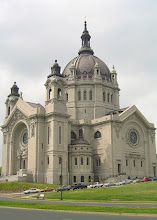On the one hand, this little aside from the introduction describes quite nicely the situation of many modern Catholics. They have a two-story universe, as it were, where the physical or natural world serves no directed purpose or end, and can be engaged, used, or manipulated as each individual sees fit, since there is no ultimate purpose behind merely material things. Only the relatively small corner of the world known as "the human soul" is subject to purpose and meaning. Divine revelation and Divine law are directed only towards the interior world of the human soul, and the purely material world is left to fend for itself, as it were. Oddly enough, it can be argued that this peculiarly modern mindset is not a very Catholic one, since the very structure of sacramental theology supports the idea that physical objects are subject to Divine purposes and can reveal or even contain Divinity itself.
Thursday, June 26, 2008
Leo Strauss, History and Natural Right - Introduction
"This means that people were forced to accept a fundamental, typically modern, dualism of a nonteleological natural science and a teleological science of man. This is the position which the modern followers of Thomas Aquinas, among others, are forced to take, a position which presupposes a break with the comprehensive view of Aristotle, as well as that of Thomas Aquinas himself. The fundamental dilemma, in whose grip we are, is caused by the victory of modern science"
On the one hand, this little aside from the introduction describes quite nicely the situation of many modern Catholics. They have a two-story universe, as it were, where the physical or natural world serves no directed purpose or end, and can be engaged, used, or manipulated as each individual sees fit, since there is no ultimate purpose behind merely material things. Only the relatively small corner of the world known as "the human soul" is subject to purpose and meaning. Divine revelation and Divine law are directed only towards the interior world of the human soul, and the purely material world is left to fend for itself, as it were. Oddly enough, it can be argued that this peculiarly modern mindset is not a very Catholic one, since the very structure of sacramental theology supports the idea that physical objects are subject to Divine purposes and can reveal or even contain Divinity itself.
On the other hand, does any intelligent Thomist believe such a thing as Strauss says here? Just because scientific methods can very capably describe the efficient and material causes of the natural world, does that really mean that modern Thomists now exclude formal and final (i.e. teleological) causes from the explanation of the natural world? I smell a a whiff of old-fashioned Enlightment-era hyperrationalism in this particular passage. Richard Dawkins would be proud.
On the one hand, this little aside from the introduction describes quite nicely the situation of many modern Catholics. They have a two-story universe, as it were, where the physical or natural world serves no directed purpose or end, and can be engaged, used, or manipulated as each individual sees fit, since there is no ultimate purpose behind merely material things. Only the relatively small corner of the world known as "the human soul" is subject to purpose and meaning. Divine revelation and Divine law are directed only towards the interior world of the human soul, and the purely material world is left to fend for itself, as it were. Oddly enough, it can be argued that this peculiarly modern mindset is not a very Catholic one, since the very structure of sacramental theology supports the idea that physical objects are subject to Divine purposes and can reveal or even contain Divinity itself.
Subscribe to:
Post Comments (Atom)

No comments:
Post a Comment